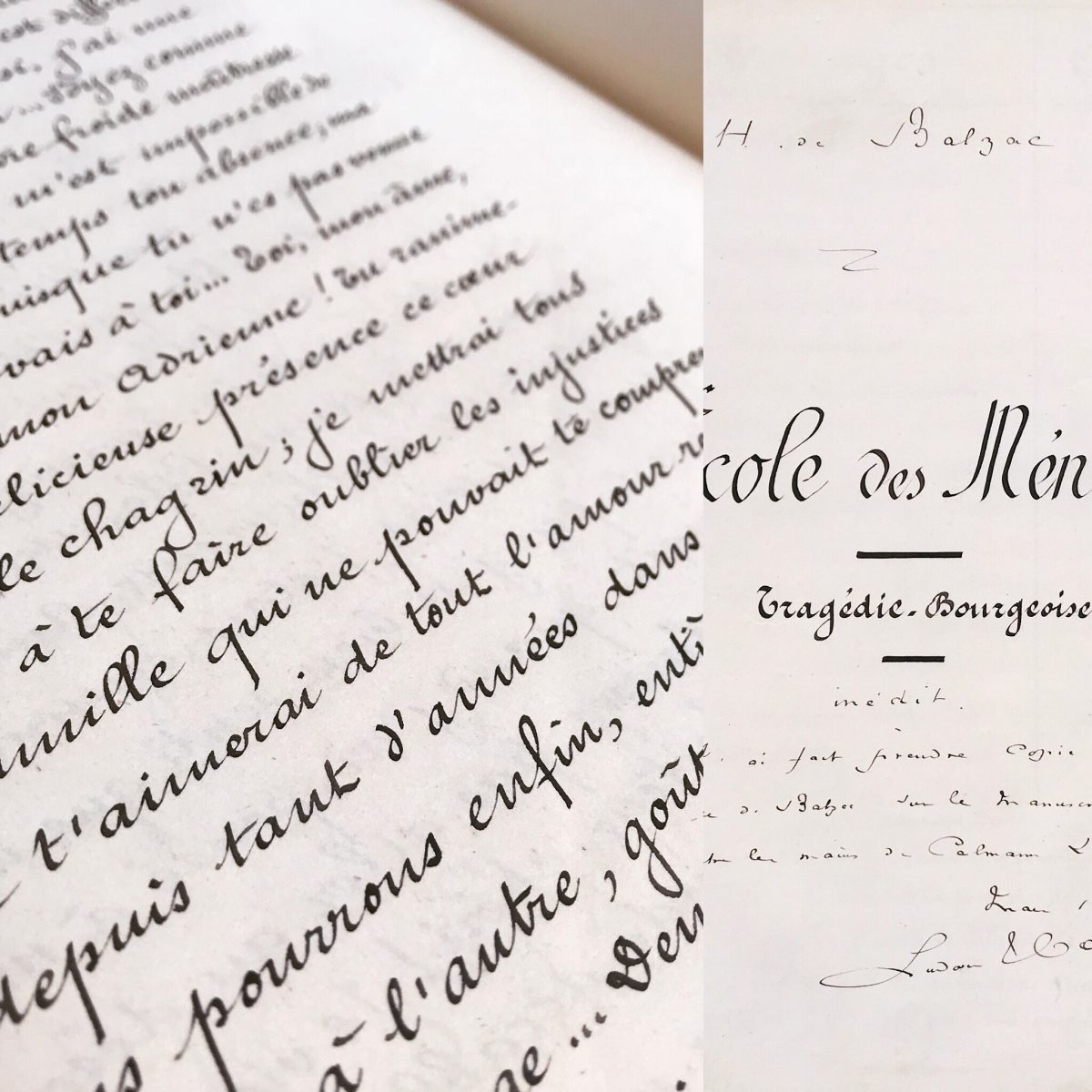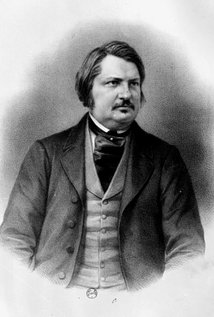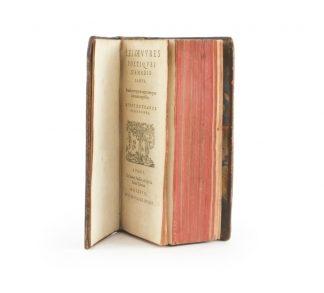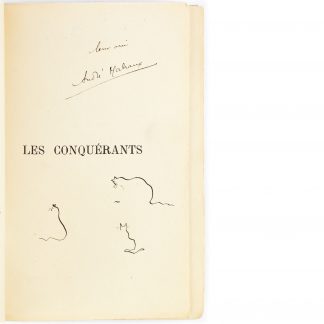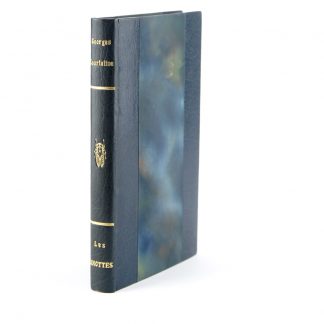Description
L'École des Ménages, a bourgeois tragedy in 5 acts and prose.
AN UNPUBLISHED VERSION COPIED FROM THE NOW LOST MANUSCRIPT.
The play is presented in a quarto volume, entirely calligraphed by a copyistdrawn up at the request of the writer Ludovic Halévy (1834-1908) on the autograph manuscript by Honoré de Balzac. This manuscript has now disappeared.
A signed autograph note by Ludovic Halévy on the title page:
"H. Balzac -
Unpublished .
I had a copy of this play by Balzac taken from the manuscript in the hands of Calmann Lévy.
Jan. 1887.
Ludovic Halévy
The manuscript was written and revised by Balzac between 1837 and 1839 with the help of Charles Lassailly and probably Laure Surville. Balzac then had a number of proofs printed, which he used, as usual, to correct and revise the play. The original manuscript did not appear in the author's archives purchased by the collector Lovenjoul after Évelyne Hańska's death. According to Pierre Descaves, who quotes Odéon director Charles de Rounat, the manuscript was deposited with the Odéon theatre in 1868 without explanation. "just as foundlings used to be deposited around the rue d'Enfer".
Finally, Halevy's note on our copy indicates that the manuscript was in the hands of Calmman Lévy in 1887.
Since then, no trace of the manuscript has been found.. All the research and editions reproduce the text of the corrected proofs, which were transferred from the author's archives to the Lovenjoul collection, then bequeathed to the Institut de France, and are now preserved as Ms Lov. A 65-65 ter and G 1040-1042.
Lovenjoul cites the corrected proofs as the only source of The Household Schoolwithout ever mentioning the manuscript.
Our copy of the manuscript shows an earlier version than that known to date, and is therefore the only witness to the genesis of this piece.
The story of The Household School is full of twists and turns, both in its genesis, its abandonment and its rediscovery.
A PIECE REJECTED AND LOST
Begun in February 1837, under the title First Miss or the Shop assistantIn 1838, Balzac wrote a first version and submitted the outline to Madame Hanska in a letter. She discouraged the author, who decided to suspend work, which resumed in March 1838 after receiving the approval of George Sand and Madame de Surville. The play took its definitive title The Household Schooland was due to be performed at the Théâtre de la Renaissance after the Ruy Blas by Hugo . Balzac's negotiations with Joly, the theatre director, prompted the author to rework his play with the help of Charles Lassailly. Gérard de Nerval, who had written the feuilleton of La Presse the interim of Théophile Gautier, recounted this episode after Balzac's death in the issue of 7 October 1850.
Balzac organised two readings, the first in the salon of Madame Couturier de Saint-Clair, the second in the home of the Marquis de Custine. Despite the great success of the readings, the play was eventually withdrawn in favour of the Alchemist by Alexandre Dumas, first performed on 10 April 1839. Balzac became discouraged and abandoned his play; it was put away in a box and not found again until 28 years after his death.
THE REDISCOVERY
The story of this rediscovery, described by the Viscount de Spielberch de Lovenjoul, who was probably the greatest Balzacian collector, is told in detail in chapter The adventures of l'École des ménages published in 1897 in Around Honoré de Balzac.
A thin printed booklet, corrected by the author, was first spotted by Lovenjoul on 15 March 1878 in the catalogue of the Balleu bookshop in Paris. Unable to buy it in time, he managed to exchange it for unpublished letters and works by Charles Baudelaire. He then discovered an unpublished work, printed by Everat in 1839 in only a few copies, but of which Lovenjoul possessed the only surviving copy. In 1905, Lovenjoul bequeathed his entire collection, which included almost all of Balzac's manuscripts and corrected proofs, to the Institut de France. In 1907, Louis Carteret produced the original edition in volume, using the text of the booklet discovered by Lovenjoul, a letter of which serves as an introduction. On reading the work, Jules Claretie turned it into a pre-naturalist play: "l'École des ménages] is, after all, only the forerunner of free theatre, which the novelist, in his vein for drama, had anticipated in a special study such as the one Zola entitled Au Bonheur des Dames."
The play was first performed by André Antoine, founder of the free theatre, on 12 March 1910 in the Salle République at the Théâtre de l'Odéon. "There were only seven performances, which were satisfactory in terms of takings [...]. The public reaction was favourable. Those of the press and critics exceeded all expectations. Balzac had waited seventy-one years to be performed at last. He won the day. (Balzac, Dramatist Pierre Descaves)
THE ORIGINAL, UNRELEASED VERSION.
Our copy, drawn up in 1887 on the original manuscript which has now disappeared, shows a very different version from the text printed since 1907.
A careful comparison of the two texts reveals the following more than a hundred differencesThese range from the simple deletion/addition of words or short phrases in certain lines to the presence of new lines and, above all, of two new scenes, important tirades, different dramatic devices and a final sentence in the form of a moral.
Act IV has 14 scenes in the printed version and 16 in our copy. Scenes 5 and 6 have disappeared from the printed version:
- The original scene 5 includes a particularly comic monologue by the cashier Roblot;
- Scene 6 allows Adrienne to give Roblot a letter that turns the play on its head in the next scene. In the printed version, this letter does not exist; it is another letter given at the beginning of Act II that serves as the dramatic springboard (this letter is present in both versions).
- The contents of the letters read by Mr Gérard are also very different: Roblot and Adrienne save the house with their savings in our copy, whereas only Adrienne gives her money in the printed version.
The differences also show their importance in the final scene of Act V, in which Gérard and Adrienne have gone mad and no longer recognise each other. The persistent love between the two characters is most apparent in two tirades that appear only in our copy. The scene begins when the judge comes to question them before pronouncing their "interdiction" [guardianship] :
- After the Judge's insistence, Gérard, in a long tirade, quotes a love letter from Adrienne: "[…] I felt that my reason was returning when I thought of my love... don't let yourself go into despair, oh my beloved benefactor! I live well, me whom everyone blames... I live to love you and devote my life to you, remaining always pure..."
- Adrienne also responds in a long monologue, quoting a letter from Gérard: "[...]. Tomorrow, I will be close to you, and we will flee together... let no vain scruple stop you! why so much mistrust with so much passion!... Ah, you know if, in dying at your feet of desire and love, I ever abused you... The delirium was at its height, you would not have resisted then... but your confidence was your safeguard, and your lover, too happy to be loved, would have deserved only your hatred, if he had taken advantage of a surprise..."
- In the printed version the Judge states: ".I won't prolong this painful scene for you... the court will pronounce the ban"and these two tirades have been deleted.
Finally, the play ends in the printed version with this line from Mme Gérard:
- "Our misfortunes are irreparable; you will stay here, so that your happiness will not be afflicted by this spectacle. Anna and I will take them to the country. If there were a favourable crisis, we should be far from the world... Ah, we have all made great mistakes!"
In the manuscript, Balzac had added a moral which later disappeared:
- […] Ah, we've all made great mistakes, and I see too late that if household harmony is often disturbed by men, it can always be maintained or restored by the devotion and indulgence of women."
This original version, copied from the manuscript (now lost) in the Calmann Lévy collection, seems to have remained unknown to this day.
Unpublished versions of Balzac's works are extremely rare.
Attached is a copy of the original edition in volume, established as mentioned on the corrected proofs:
The Household School
Paris, Carteret, 1907. Large in-8, 180 x 270 mm, paperback, 239 pp. long-grained caramel half-maroquin slipcase.
FIRST EDITION.
ONE OF THE FIRST 75 COPIES ON JAPON.
This one is in the name of Jules Claretie, with a signed autograph letter from the publisher:
"[a copy offered to Mr Jules Claretie
with thanks to the publisher
L. Carteret".
Source : Ludovic Halévy, autograph note signed, engraved bookplate pasted on.
Reference :
Around Honoré de Balzac, vicomte de Spielberch de Lovenjoul, 1897.
Balzac exhibitionNo. 324, Pierre Béres, 1949.
The works and days of Honoré de Balzacpages 169 and 174, Stéphane Vachon, 1992.
Balzac: DramatistPierre Descaves
Balzac, the eternal genesisJacques Neefs ed. 2015
Bound in the Bradel style, blue half-percaline, havana title page, gilt title.

